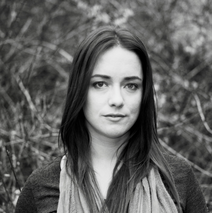 Ameila Gray Ameila GrayPhoto by Matt Chamberlain Amelia Gray is the author of AM/PM (Featherproof Books) and Museum of the Weird (FC2), for which she won the 2008 Ronald Sukenick Innovative Fiction Prize. Her first novel, THREATS, was published by Farrar, Straus and Giroux. Her writing has appeared in Tin House, American Short Fiction, McSweeney's, and DIAGRAM, among others. Find more at ameliagray.com or on Twitter @grayamelia. Kathryn Mockler: What is your first memory of writing creatively? Amelia Gray: My mom let me use her typewriter and I typed a story about Snoopy. I must have been 5 or 6. The story was heavily illustrated. I can't remember for sure, but I think some pretty bad shit happens to Snoopy. KM: Why did you become a writer? AG: It made me feel better when I was feeling low. KM: What influences your writing the most? AG: It's a toss-up between men, god and the internet. KM: Could you describe your writing process? (For example, do you write every day? When? Where? How do you approach revision, etc.) AG: I generally write in the morning, at my computer, in my little windowless office, in a WordPad file. I like to write every day, though sometimes when I don't have any projects going, I'll take some time off or stare at something in the morning or afternoon with the intention of revising it. KM: Rejection or criticism can often stop new writers before they start. Do you have any advice on how to deal with rejection? AG: Develop an ugly, unstoppable ego. KM: What writers would you recommended to an aspiring writer? Or what writers were influential to you when you first started out? AG: Barry Hannah, Flannery O'Connor, David Foster Wallace, James Joyce, Vanessa Place, Russell Edson, Sylvia Plath, James Tate, Raymond Carver, Richard Ford, Denis Johnson, Shirley Jackson. KM: What is the best literary advice you've gotten that you actually use? AG: Denis Johnson says you should write ten minutes a day. KM: What are you working on now? AG: Collecting short stories. Some other things. 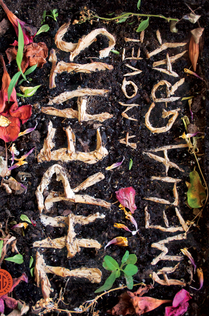 AMELIA GRAY'S MOST RECENT BOOK THREATS, Farrar, Straus and Giroux, 2012 Description from Farrar, Straus and Giroux David’s wife is dead. At least, he thinks she’s dead. But he can’t figure out what killed her or why she had to die, and his efforts to sort out what’s happened have been interrupted by his discovery of a series of elaborate and escalating threats hidden in strange places around his home—one buried in the sugar bag, another carved into the side of his television. These disturbing threats may be the best clues to his wife’s death: CURL UP ON MY LAP. LET ME BRUSH YOUR HAIR WITH MY FINGERS. I AM SINGING YOU A LULLABY. I AM TESTING FOR STRUCTURAL WEAKNESS IN YOUR SKULL. Detective Chico is also on the case, and is intent on asking David questions he doesn’t know the answers to and introducing him to people who don’t appear to have David’s or his wife’s best interests in mind. With no one to trust, David is forced to rely on his own memories and faculties—but they too are proving unreliable. In THREATS, Amelia Gray builds a world that is bizarre yet familiar, violent yet tender. It is an electrifying story of love and loss that grabs you on the first page and never loosens its grip. Read a new short story by Amelia Gray here and more short stories here. 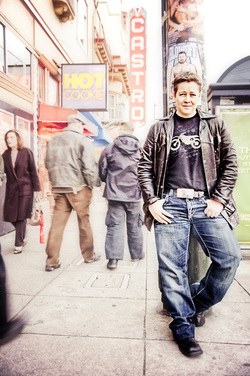 Ivan E. Coyote Ivan E. CoyotePhoto by Eric Nielson Ivan Coyote was born and raised in Whitehorse, Yukon Territory. An award-winning author of seven collections of short stories, one novel, three CD’s, four short films, the editor of an anthology, and a renowned performer, Coyote's first love is live storytelling, and over the last eighteen years they have become an audience favourite at music, poetry, spoken word and writer's festivals from Anchorage to Amsterdam. The Globe and Mail called Coyote "a natural-born storyteller" and Ottawa X Press said "Coyote is to CanLit what k.d. lang is to country music: a beautifully odd fixture." Their column, Loose End has appeared monthly in Xtra West magazine for eleven years. Coyote's first novel, Bow Grip, was awarded the Relit award for best fiction and named by the American Library Association as a Stonewall honor book in literature, and is in development to be made into a feature length film. Their new collection of short stories, Missed Her, was released in September, 2010. Coyote also recently co-edited Persistence: All Ways Butch and Femme with Zena Sharman. Coyote’s latest short story collection, One In Every Crowd, a young adult collection of stories compiled for queer high school kids, was released in April 2012. RUSTY TALK WITH IVAN COYOTE Sara Jane Strickland: What is your first memory of being creative? Ivan Coyote: I am not sure if I have a memory of this or not, or if I feel like I remember it because there is an old old photo of me doing this, but I have a memory of setting up pots and pans like a drum kit on the front deck of my parent's first house and playing the drums on them. I would have been about two or three. SJS: How would you describe your writing process? IC: Deadline driven. I set or get goals and dates, and I try to follow them. I have thousand word days. I make myself write a thousand words, good or bad, not perfect words, just out there. Out of my head and onto the page. Also I make lists of scenes or chapters or stories or ideas and then I just try to write them and cross them off. SJS: What are you working on right now? IC: A novel and a survival guide for tomboys. Also two live shows, both collaborations with musicians. SJS: What is the revision process like for you? IC: I just grin and bear it. SJS: What influences your writing the most? IC: Life. Other books. Other writers. The sky. The weather. How much I have been to the gym lately. Music. Dance. Painting. Movies. Things I overhear on the bus. Kids I meet. People I meet. Loved ones. Loved ones dying. New ones being born. Life. SJS: How did you deal with rejection when you first started out? IC: The first book I was a part of writing, we got asked by the publisher for a manuscript, so I have an unusual story. I didn't have to deal with a lot of rejection right out of the gate. SJS: What keeps you going as a writer or why do you write? IC: I write because I love it more than anything else in my life. I write because I don't know or remember how to be anything else anymore. I write to pay the bills. I write to change the world. I write because I have a deadline. I write because not writing is no longer an option for me. I write because it is the only way to navigate this life, for me. SJS: What is the best thing about being a writer and the worst thing? IC: The best thing? Working alone from home with no pants on. The worst thing? Working alone from home with no pants on. 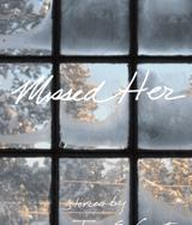 IVAN COYOTE'S LATEST SHORT FICTION COLLECTION Missed Her, Arsenal Pulp Press, 2010 Description from Arsenal Pulp Press: Ivan E. Coyote is a master storyteller and performer; their beautiful, funny stories about growing up queer in the Canadian north and living out loud on Canada's west coast have attracted big audiences, whether gay, straight, trans, or otherwise. In their passionate and humorous new collection, Ivan takes readers on an intimate journey, both literal and figurative, through the experiences of their life: from their year spent in eastern Canada, to their return to the west coast, to travels in between. Whether discussing the politics of being butch with a pet lapdog, befriending an effeminate young man at a gay camp, or revisiting a forty-year-old heartbreak around her grandmother's kitchen table, Ivan traverses love, gender, and identity with a wistful, perceptive eye and a warmth that's as embracing and powerful as Ivan themself. Reviews What happens when a woman with "dykey clothes" confronts a man with a bushy beard about the lesbian book he's reading? Is life easier for a butch or a lipstick lesbian? Is it better to be queer in Whitehorse, where you're subjected to direct questions, or in Vancouver, where PC politeness masks embarrassed confusion? Missed Her, a collection by Vancouver writer and performer Ivan E. Coyote, conveys these lifestyle collisions with thoughtful humour ... Thematically, Coyote's writing has grown in complexity and depth. --Rabble.ca These vignettes read as though they've been freshly torn from a wanderer's notebook, where they were immediately jotted down so as not to lose the vibrancy of the experience. The result is refreshing and tearfully real--Coyote has a gift for blending the tragic and comic in a way that renders a reader gobsmacked ...The writing in Missed Her is direct yet lyrical, poetic yet unadorned, reaching simultaneously for the heart and the gut with brevity and power. --Quill & Quire (STARRED REVIEW) Read More 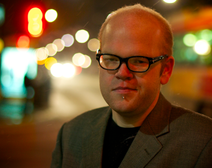 Jacob McArthur Mooney Jacob McArthur MooneyPhoto by Mike McPhaden Jacob McArthur Mooney is the author of The New Layman's Almanac (McClelland & Stewart, 2008) and Folk (M&S, 2011), the latter of which was a finalist for the Dylan Thomas Prize and named to best-of-2011 lists by The Globe and Mail, The National Post, and his mother. RUSTY TALK WITH JACOB MCARTHUR MOONEY Kathryn Mockler: What is your first memory of writing creatively? Jacob McArthur Mooney: I feel like there's a level at which this is a question about lying. Telling fibs is a proto form of creative writing. And I've been doing that for some time. But if you mean, Writing Things that were Untrue with the Intention of Sharing Them as Untruths, then maybe that's later. I don't remember writing much as a kid. College maybe? College, with a handful of moments and phases beforehand. But mostly college. KM: What keeps you going as a poet or why do you write? JMM: I always hear "what keeps you going" as a very wishy-washy, very weak-of-soul question. Not that you're wishy or washy to ask it. I feel your asking is a test, and I'd be wishy and washy if I failed the test by answering it ironically. What do we mean: What keeps me going? Is poetry arduous? Is it a chore? Really? I suspect that people who think poetry is hard have lives that are too easy. It’s a fun, freeing, extrapolation on your life. Consider it thusly and you won’t let yourself think about “keeping going” anymore. It's a challenge to do it well, but the challenge is always enjoyable. Almost always, anyway. The challenge is enjoyable during the majority of its lifespan. What keeps me going? Liking it. I like doing it, and so I do it more. Positive feedback loop. The cycle continues. Hamster; jogging. Response, reward. That being said, maybe if I thought it had stopped being fun, I’d stop. Maybe, one day, that’ll happen. I can’t predict the future, but for now: I’m kept going by momentum and the lack of objects in my path. Like a spy satellite. KM: Could you describe your writing process? (For example, do you write every day? When? Where? How do you approach revision, etc.) JMM: Not every day. Most days, maybe. I've definitely had stretches where I write every day for several months, but also stretches where I go pretty barren for a long time. Dennis Lee once told me he's the owner of multiple 6-month long "No New Poetry" stretches. Having heard that, I've started to embrace my own. If I don't seem to be writing new stuff, I edit. And really, I edit, juggle, rework and pester a lot more than I write new stuff. Anything less than an 80:1 ratio of Time Spent Tinkering: Time Spent writing that First Draft, and you're likely not a very good poet. Or at least, not the kind of poet you could be. I like to stay as mobile as possible, and as unencumbered by superstition. I keep notes everywhere. Usually there's a notebook in my pocket when I leave the house. I use my work computer, my phone, my home computer, whatever. Bits of paper and receipts. And this is really for the 1, not for the 80, in that previously-mentioned ratio. The 80 is more private. I can sometimes stomach being in a cafe or something, but for the most part my reworking process happens at home. KM: Rejection or criticism can often stop poets before they start. Do you have any advice on how to deal with rejection? JMM: It's going to happen. Everyone gets rejected. It doesn't mean you suck. Sometimes, it means they suck. KM: How would you describe writer/editor relationship? What can novice writers expect? JMM: First off, the novice writer should consider themselves lucky that they get to work with an editor in the first place. The true "editor", for poetry especially, is going extinct. Most journals staff out editorial work to undergrads and they are only there to accept/reject, not edit in any true sense of the word. They aren't going to make your work better than it was when you submitted it. It's not as bad when you're talking books, most Poetry Editors at presses will help you along to some degree. I've been really lucky in my poetry life to have good editors. Stan Dragland and Molly Peacock and Anita Chong at M&S. And, more casually than that, all my friends and mentors along the way that have gotten their hands into my manuscripts. An ideal relationship between a writer and an editor consists of equal parts friction and ease. They should, broadly speaking, see the work like you see it, be able to slip into your vocabulary and your rhythms. But they're also there to be a separate set of eyes, so they should be distinct enough to question what you're doing, within that general context of "getting it". Genetically speaking, an ideal editor is your cousin, but not your identical twin. KM: What poets are you reading now? JMM: I have a cycle with JH Prynne where I have to re-read his collected work every year or so, and am doing so now. Participating in the Irving Layton gig at Harbourfront last week has renewed my interest in Layton, also. I was away for the second half of 2011, first as the Pierre Berton Resident in Dawson City YT and then as a sort of travelling hobo with a European Rail pass, so I missed a lot of good books. I liked the new Stefanie Bolster and Mark Callanan titles quite a bit. I read with Don McKay in Halifax last month and managed to pocket his new one, too. Everything that dude does is perfect. It's like he's challenging himself now with progressively less interesting source material: from birds to, now, rocks, and he's still coming up with invigorating, completely exciting, work. I'm on a non-fiction kick now, too. I've been digesting works of economic history, some surveys but other more specific titles in areas like the development of international finance, and Mergers & Acquisitions. This is in part for my day-job, but I'd do it for kicks, anyway. The vocabulary is so rich; big tasty Latinate everywhere. Maybe I end up using this stuff in my poetry, maybe not. Either way....you stick it in your cheeks and save it for a cold day, because you never know. KM: Your funniest literary moment, if you have one. JMM: Oh man. What if I didn't have any? What would that say about me? My time at the Guelph MFA program is rich with lost nights full of long, barely-remembered, and completely inexcusable stories. But what's college for if not the indexing of a catalogue of inexcusable stories? KM: What are you working on now? JMM: I continue to try and roll a novel uphill, only to have it coast back down the other side on me. I've been working away at it for several years now. I don't know if it's closer to finished than it was in 2010. Novels are hard. If I had put this time into trying to become a professional baseball shortstop instead of a novelist, I wonder if I'd be any further along. I'm writing some new poems. I think that the three-year gap between books 1 and 2 will be eclipsed, easily, by the gap between books 2 and 3. I'll write what comes, I guess. And tinker with the rest. 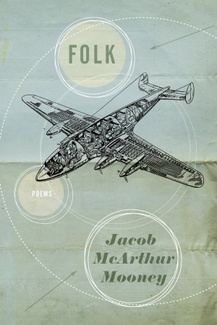 JACOB MCARTHUR MOONEY'S MOST RECENT COLLECTION Folk, McClelland & Stewart, 2011 Description from McClelland & Stewart The two sections in Jacob McArthur Mooney’s virtuoso collection – one rural in orientation, one urban – open an intricate conversation. Taking as its inciting incident the 1998 crash of Swissair Flight 111 off the coast of Nova Scotia, before moving to the neighbourhoods around Toronto’s Pearson International Airport, Folkis an elaborately composed inquiry into the human need for frames, edges, borders, and a passionate probe of contemporary challenges to identity, whether of individual, neighbourhood, city, or nation. Mooney examines the fraught desire to align where we live with who we are, and asks how we can be at home on the compromised earth. This is poetry that poses crucial questions and refuses easy answers, as it builds a shimmering verbal structure that ventures “beyond ownership or thought.” Mooney’s distinctive voice is seriously unsettling, deeply appealing, and answerable to our difficult times. |
Rusty Talk
Rusty Talk Editor: Archives
November 2017
Categories
All
|

 RSS Feed
RSS Feed
